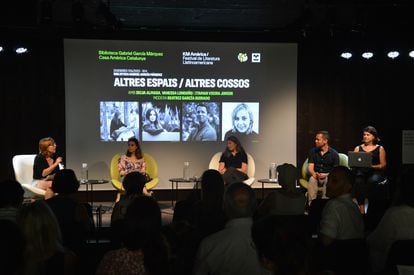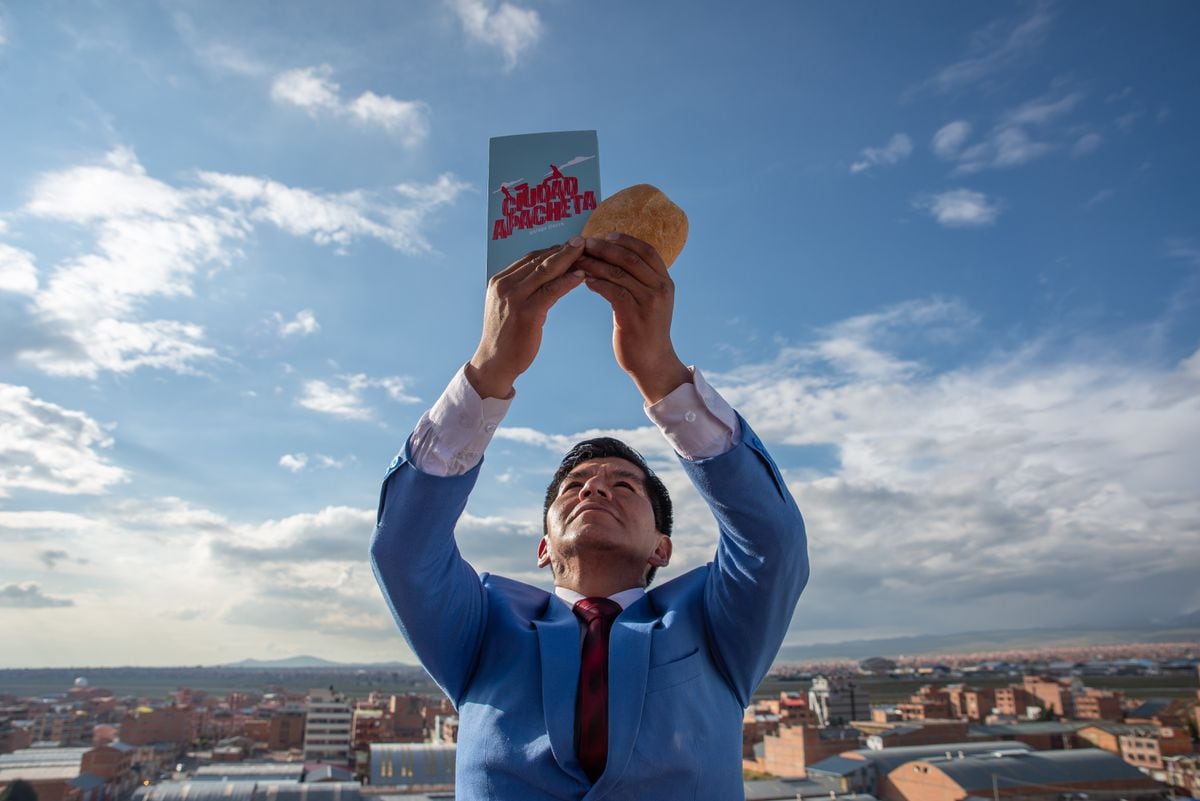Four Latin American writers submitted to a game last Saturday, during the third day of the KM Amèrica festival in Barcelona: a bingo with anonymous questions from the public.
Soon the box of thunder was opened.
"How would you define current Latin American literature?"
The eyes in the new García Márquez Library, one of the two venues together with Casa Amèrica Catalunya, were expectant.
“It's a quilombo”, said Martín Caparrós (Argentina), among the laughter of the attendees;
Laura Restrepo (Colombia) suggested that its diversity was “uncomfortable” for those seeking to classify it;
and Cristina Rivera Garza (Mexico) wondered if we should include writers of Latin American origin who do not write in Spanish.
"Talking about Latin America has always been very complex," synthesized Puerto Rican Marta Aponte,
at the end of the session.
The comments made reference to the different geographies, the languages, the melting pot of cultures... There was only room left to sketch a living cartography, that of the different literatures of Latin America.
The organization of the festival, which lasted four days, already raised this diversity in its proposal: 22 writers of different generations, from 11 countries in the region, debated at tables with titles such as
Other spaces/other bodies
or
The search for the alien
.
"There are very different literatures now in Latin America," says Eduardo Ruiz Sosa, the Mexican writer (resident in Barcelona) who has curated KM Amèrica.
It's been a hectic few days.
Along with his second coffee, on Saturday morning, he says that he thought of authors who did not come from traditional urban centers, "that are associated with the peripheral", multiple thematic and formal proposals, as well as a balance between large and small publishers. .
Of course, Ruiz Sosa acknowledges that "there are many points of contact, common concerns."
One of the themes that ran through the festival was that of violence.
The table "The search for the foreign", during the second day (Friday 17) of the KM Amèrica festival in Barcelona.
From left to right: Víctor Balcells (moderator);
Bruno Lloret;
Alain-Paul Mallard;
and Martin Caparris.
Courtesy: Casa Amèrica Catalunya.
The word appeared on all the tables, and the writers consulted agreed in designating it as a determining axis in the poetics that have been developed in the region in recent years.
The speech, however, was far from unequivocal.
During his intervention, Caparrós criticized the "overrepresentation" of violence in current Latin American literature, which does not correspond to the "enormous but infinitely smaller" figures of victims in other regions of the world during the 20th century.
The author of
Ñamerica
(Random House, 2021), the study that hybridizes genres (as before in
El Hambre
) with the aim of rethinking the Spanish-speaking part of the continent, maintained that if these figures are taken into account “one could infer that Latin America was the most peaceful continent in the world.
But that is not the idea we have."
The celebrated Ecuadorian writer Mónica Ojeda, who has explored, among other aspects, violence in novels such as
Mandibula
(Candaya, 2018), clarifies: “Latin American writers who work on violence are doing very delicate work, with a lot of ethical reflection: I think that writing allows us to think about the fear of people who come from such hostile countries, where violence is structural and cannot be accounted for”, he adds, before alluding to “collective and community writing” as another of the axes of literature current Latin American, a "philosophy" that is developing, where it is understood that writing also contains "the voices of others", the voices of the community.
The table "Other spaces / Other bodies", during the second day (Friday 17) of the KM Amèrica festival in Barcelona.
From left to right: Beatriz García (moderator), Vanessa Londoño, Selva Almada and Itamar Vieira.
Courtesy: Casa Amèrica Catalunya.
All roads seem to lead to Cristina Rivera Garza, one of the references most mentioned by the writers present, including Ojeda, especially those who have published their books in recent years.
The author of
The invincible summer of Liliana
(Random House, 2021), the documentary research on the femicide suffered by her sister, has worked on many of the themes that run through the letters of Latin America today: the body, ecological literature, testimonial writing or the archive understood in a broad sense, both the documentary search and "the earth, our first great archive".
“I try to work on the relationship between literature and community,” Rivera Garza points out to this newspaper: “I try to be very alert to the version that others have of their experience, without replicating the concepts of committed literature of the 20th century.
This taking into account the differences of class, race, gender... telling human stories, but also incorporating absences”.
There has been an eloquent silence during part of the festival: hardly any references have been heard to the Latin American boom, the literary phenomenon that was promoted largely from Barcelona in the sixties and seventies, through literary agents such as Carmen Balcells or the Seix Barral publishing house. .
"I think it's because of the oversaturation of the
boom
discourse ," reflects Carlos Fonseca, the Costa Rican writer who has just published
Austral
(Anagrama, 2022).
The also professor of Latin American literature at the University of Cambridge tells this newspaper that, when the continent's writers realized that the
boom
"was not the only reference", this also helped to return to the authors of the aforementioned movement "without the topics" that had been created around him.
Fonseca gives an example: when the Mexican Fernanda Melchor publishes the novel
Hurricane Season
(Random House, 2017), she points out that “its immediate reference” is
The Autumn of the Patriarch
, by Gabriel García Márquez.
MORE INFORMATION
The last party of the Latin American 'boom'
Among the references of the authors consulted, in addition to Rivera Garza or Marta Aponte, names such as Roberto Bolaño, Juan Rulfo, poets such as Raúl Zurita or the Mexican Elena Garro, a "fundamental" author in
El asedio
animal
(Almadia, 2021), as pointed out during the first day by its author, the Colombian Vanessa Londoño, who reflects in her work on political violence in Colombia.
Among the writers in other languages, Fonseca mentions, for example, the German WG Sebald.
"Then the presence that Faulkner continues to have caught my attention," adds the Costa Rican about the historical and transversal importance of the author of
The Sound and the Fury
among Latin American writers: "I think it is maintained by the ecological crisis and the representation of the rural in his work, it shows an alternative to urban spaces, something that also happens here with empty Spain."
dialogue between genders
One of the commitments of the festival, which seeks to establish itself in the cultural scene of Barcelona after its first edition, is to promote dialogue between artistic genres.
The case of
La weak mental
, the novel by Argentinean Ariana Harwicz that exposes the dark side of the relationship between a mother and a daughter, is paradigmatic in this sense: “When I think of a scene in my novels, I am seeing it with theatrical eyes, that is to say, with dramatic force and ellipsis”, confessed Harwicz during the third day, before the staging of the adaptation of his work, directed by Elena Fortuny.
A scene from `La weak mental´, the play directed by Elena Fortuny and inspired by the novel by Ariana Harwicz, during the KM Amèrica festival in Barcelona.
In the image, the actresses Isabelle Bres (left) and Flor Braier (right).
Courtesy: Casa Amèrica Catalunya.GustavoGermano
For the next edition of the festival, the novel to be adapted will be chosen by a jury made up of Aina Tur (author and head of programming at Sala Beckett);
Jorge Volpi (writer and director of the National Autonomous University of Mexico), and Jorge Carrión (writer and literary critic).
This edition has also been released with a literary route, during the fourth day, dedicated to Gabriel García Márquez, who lived more than five years in Barcelona.
The KM Amèrica festival, with full rooms during the sessions, has renewed the idyll of Barcelona with the literature of a continent that beats strongly.
You can follow EL PAÍS Catalunya on
and
, or sign up here to receive
our weekly newsletter







/cloudfront-eu-central-1.images.arcpublishing.com/prisa/KLCNKA5I2NGKNNRSB7BSD5VJHE.jpg)




/cloudfront-eu-central-1.images.arcpublishing.com/prisa/KMEYMJKESBAZBE4MRBAM4TGHIQ.jpg)


